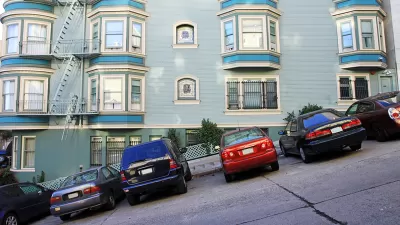The infamous MonkeyParking app that last year ran afoul of public sentiment and the law is back with a new business model that offers residents the chance to auction that most precious of commodities—urban parking space.
"This month, MonkeyParking quietly returned to San Francisco in a below-the-radar beta mode," reports Joe Eskenazi. The re-appearance of the app includes an all new business model. According to Eskenazi, "[in] its new model, rather than enable users to peddle public property—which is both illegal and morally dodgy—MonkeyParking is now focused on private property: driveways, to be specific. If you pull out of and pull into your driveway for five minutes a day, [MonkeyParking CEO Paolo] Dobrowolny says, then a valuable resource is lying fallow for 23 hours and 55 minutes a day."
Eskenazi cites a deputy San Francisco city attorney to note that the new business model is, in fact, legal, unlike its predecessor, which would have auctioned off public parking spaces.
The opportunity for the 100 test users enlisted by MonkeyParking to test the new model in San Francisco is actually the space on the street in front of the driveway, where property owners are allowed to park or grant others permission to park, because most driveways in the city are not large enough to fit a car without blocking the sidewalk.
FULL STORY: MonkeyParking Is Back and Ready to Disrupt Your Driveway

Manufactured Crisis: Losing the Nation’s Largest Source of Unsubsidized Affordable Housing
Manufactured housing communities have long been an affordable housing option for millions of people living in the U.S., but that affordability is disappearing rapidly. How did we get here?

Americans May Be Stuck — But Why?
Americans are moving a lot less than they once did, and that is a problem. While Yoni Applebaum, in his highly-publicized article Stuck, gets the reasons badly wrong, it's still important to ask: why are we moving so much less than before?

Using Old Oil and Gas Wells for Green Energy Storage
Penn State researchers have found that repurposing abandoned oil and gas wells for geothermal-assisted compressed-air energy storage can boost efficiency, reduce environmental risks, and support clean energy and job transitions.

Minneapolis Bans Rent-Setting Software
Four cities have enacted restrictions on algorithmic software that can inflate rent costs.

Oakland to Add 244 New EV Chargers
Oakland plans to launch its new charging network at eight locations by the end of 2025.

Jane Goodall Inspires with Message of Hope, Resilience, and Environmental Action
Speaking in Pasadena, Jane Goodall offered a hopeful and inspirational message, urging global compassion, environmental responsibility, and the power of individual action to shape a better future.
Urban Design for Planners 1: Software Tools
This six-course series explores essential urban design concepts using open source software and equips planners with the tools they need to participate fully in the urban design process.
Planning for Universal Design
Learn the tools for implementing Universal Design in planning regulations.
Heyer Gruel & Associates PA
City of Moreno Valley
Institute for Housing and Urban Development Studies (IHS)
City of Grandview
Harvard GSD Executive Education
Salt Lake City
NYU Wagner Graduate School of Public Service
City of Cambridge, Maryland



























